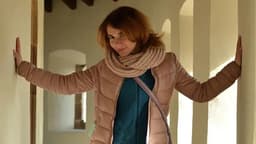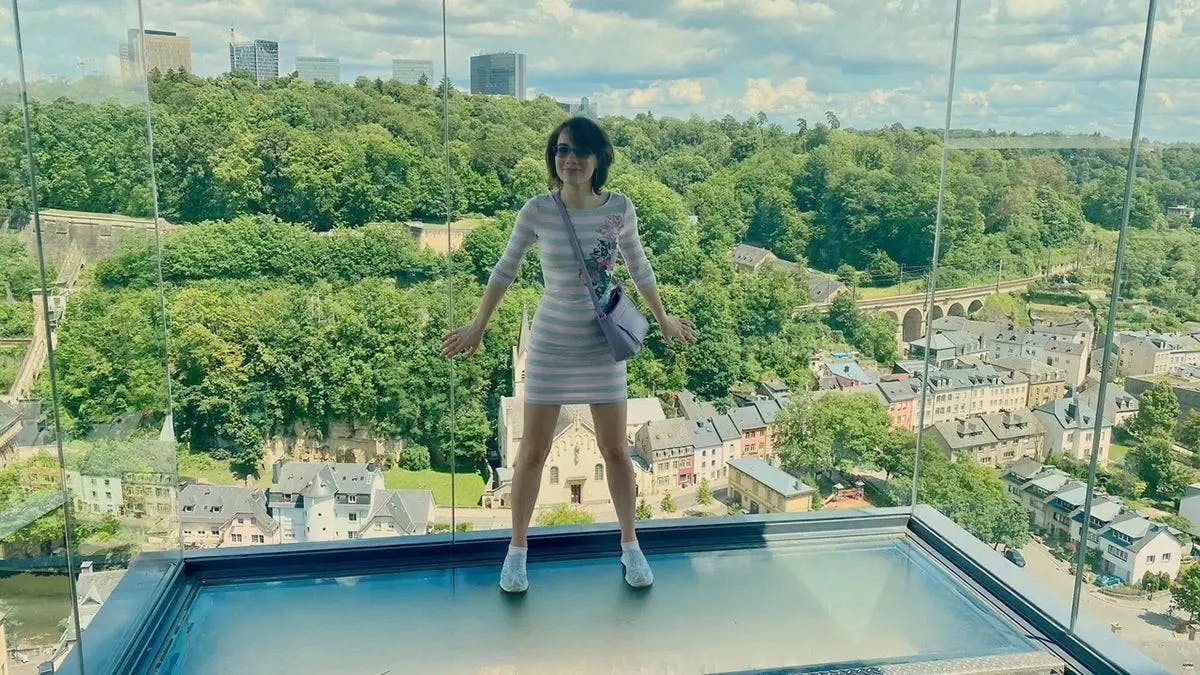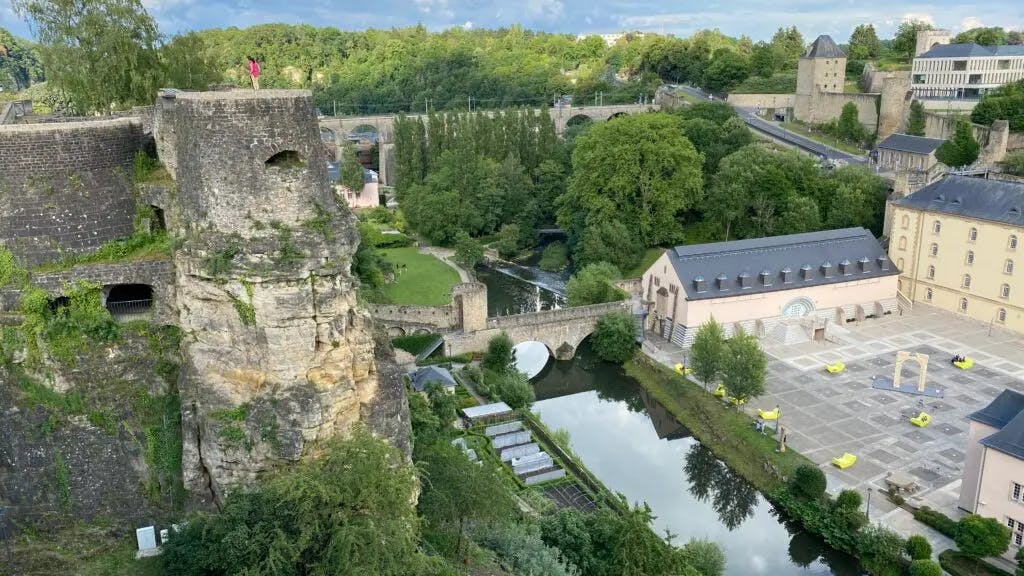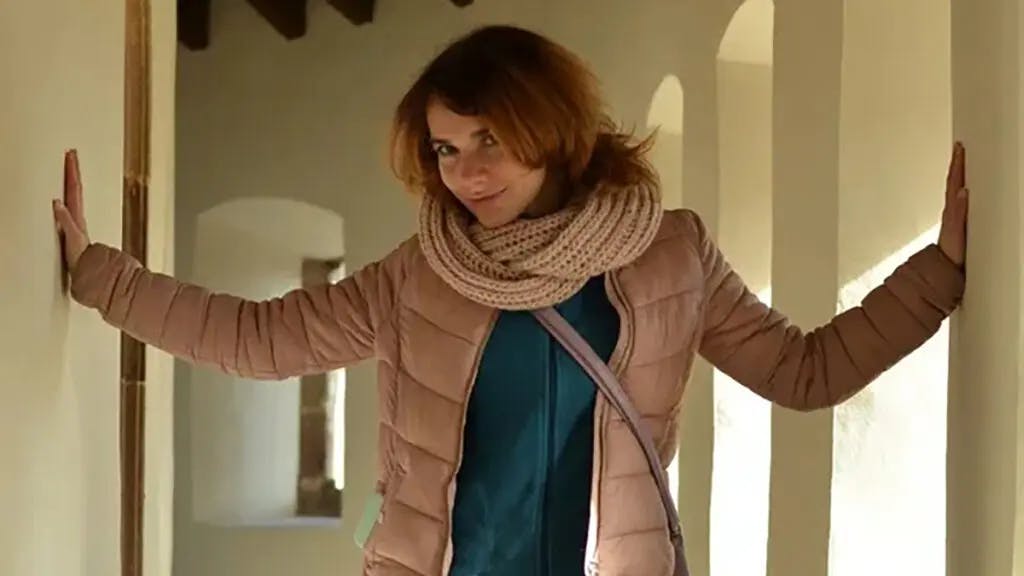I wanted to see the country, but then I stayed forever



Of course, it didn't happen all at once, but I'll start in order.
This interview will be useful for those who want to know how to:
- Move to Luxembourg without a Blue Card;
- Take out a mortgage;
- Open your own school;
- Pass the exams and get citizenship;
- Use the tax and paperwork tricks.
Translator or programmer
In 7th grade I was concerned about choosing a profession. It was a conscious step, because I wanted a profession that would help me earn money. At university, I met many people who went to study because parents insisted. But this was not my option
There were many options, and in the end I decided on two: translator and programming. Programming won out. I had a computer at home since I was 3 years old, my dad worked as a system administrator. At some moment I realized that it was more interesting and cooler.
It is very difficult to move to Europe without a degree.
I didn't move under the Blue Card, so in my case the process looked a bit different than for highly paid employees. And, I must admit, longer.

It was so long ago... I remember for sure that I provided all the diplomas. Because it's a mandatory requirement. I often tell my students too that it's quite easy to study frontend. But to move to Europe without the proper education is quite difficult. Some companies ask for a degree when you move. I recently had a job interview, and they asked me to send at least a photo of my diploma.
They also asked for a birth certificate and a certificate of no criminal record - you can't go anywhere without them. In addition, I also had to prepare a CV and a letter of motivation.
I prepared all this in the summer. And then I waited until November, because Luxembourg has its own rules. They must first publish the vacancy in their own country. If after a while no local specialists respond to it, the company gets permission to hire an employee from abroad.
The D visa only allows you to enter the country 1 time.
When the bureaucratic issues were resolved, I went to the embassy to get a visa. I was issued a D visa. However, its specific feature is that you cannot re-enter the country with it. It is given to allow you to enter the territory, and then you have to apply for a residence permit.

I had an unpleasant story when I was in Russia and my residence permit expired. And I had to get a new visa at the embassy and pay the fee (it was 50 euros at the time). Unfortunately, it is impossible for Russian citizens to enter the EU without a visa. I must say that I submitted my documents in advance, but that time they took a very long time to check them, and I left without waiting for a new residence permit. That's why I found myself in this situation.
Otherwise, the process for newcomers is the same: registration in the municipality - medical examination - residence permit.
For example, my husband came in February, I registered him at my place, and then he still had to go for a medical examination. It is just easier for him because he is Ukrainian, he does not need a visa.
Medical check-ups are now much more complicated. After Covid, the lines for TB screening became longer. And the system is still in place. That is, almost all the restrictions have been lifted, but there is still a limit on the number of one-time visitors. Therefore, it is not possible to do everything in a couple of days, the nearest dates are often several months away. The same applies to the biometric data, we will come back to this.
A lot of things used to be done just in a second, but now it's by appointment only.
One more important detail. CNS - aka insurance number - is not automatically entered into the database. I registered my husband, they gave him a code, and then he couldn't see a doctor for free because it wasn't in the database. I contacted CNS and they sent me a one-page application. I filled it out, sent it in, and only then did they put my husband in the file cabinet.
No one talks about it and no one will tell you. Because when companies transport employees, they usually just give them a bunch of documents to sign. And the guys often don't even know what they are signing!
In general, now all processes have become longer, also because of the large flow of people. Even for obtaining a residence permit there are now long queues.
But there's a life hack! I found out about it by accident. In November of that year I came back, I had just applied for a new residence permit to replace the expired one, and in December I had to fly to Ukraine to get married.
I call the Ministry, I tell them I have this situation, I have tickets, I have a wedding, can I come early to take biometrics?
And my dear Luxembourg met my needs! They gave me the phone number of the people who deal directly with appointments, and they made an appointment for me the next morning.
I realized an important thing - you need to be able to negotiate politely. Very often people are very accommodating.
Banks are like the market - you have to bargain with them
This is a pretty non-obvious thing. Let me explain it with the example of buying a house.
I bought a house here with a mortgage. This, by the way, is another reason why I am uncomfortable living in my homecountry. In your own house, there are no children stomping around upstairs, no neighbors shouting, and you get used to calm. We hardly hear our neighbors at all. Well, that is, children's crying or repairs, of course, can be heard with open windows. But in the evenings they don't make much noise and domestic quarrels don't reach outsiders either.

So, to buy a home here, you need income, of course. I don't know whether foreigners can come to the bank and try to take out a mortgage, so I will talk about those who live and work here. So the second important point is mandatory employment.
Then you go to the bank, prove your income, and say you want a home for a certain amount. After that, the bank will start making offers.
More experienced people have taught me that you have to argue with banks, like in the market. They offer you one thing, but you don't agree with them, saying that you don't like the terms.
What I did. I went to all the popular banks, asking how much money they could lend me and at what interest rate. At the same time, I also turned to brokers, who offered a rate of 0.8%. And the bank had previously said 1.7%.
After that, I went to the banks for another month, but I was able to get the rate down from 1.7% to 1.4%. It turned out to be a fixed loan for 30 years. I could have gone for 20, but I decided on my own option. It turned out to be a very good decision, because now, even despite the war, the bank simply cannot raise my rate!
When taking out a mortgage, banks make you sign up for life insurance. In fact, they have no right to do so, and you can refuse. The main thing is to stand your ground. Some banks then refuse, for example, Raiffeisen.
I only found out about it myself when the manager changed. And the new one told me that with my age and health condition, I should not have been offered insurance at all. But that's the way it turned out. I wasn't very experienced at the time, so I took it out. Now I tell everyone to say no if you don't want it.
The services of a financial advisor certainly cannot be wrong
Something else you should definitely not neglect in Luxembourg is tax or financial advisors. These are essentially people who are very well versed in the law and can take on some of the headaches.
When it comes to your personal budget, you have to be careful. In my case, the tax office miscalculated something and added more than 10,000 euros of extra income. Needless to say, it was also taxed. The good thing is that it can be appealed.
A consultant will also be useful if you are starting your own business. In Luxembourg there are a lot of nuances with the types of companies, so it's better to ask for help sometimes. This was the case with my school, for example.
You need to submit your documents, start your business and don't be afraid.
I opened a programming school here in Luxembourg in 2019. It's name is Skillup School. Before that, I worked as a teacher and mentor in different educational institutions.
The whole process took about two months and the license was mailed to me. All this time I was assisted by a fellow lawyer. It is always better to check with those who have already gone through some of the stages. If you don't know any specialists, that's okay too. You can ask in Facebook groups, there are a lot of people there who are willing to help.
The main thing is not to be afraid to ask and submit documents. You will always be notified here if something is missing.
To start your own business you will need business license. In my case, since it's a school,I need an additional license- for educational activities. You will have to prove your diploma and work experience.
First of all, I signed up for a a counseling session for aspiring entrepreneurs. They describe the necessary documents and steps in detail. Then I received a special brochure on how to obtain a business license.
Documents can be submitted online through Guichet, but you will require business section access.
So, package of documents to start your own business:
- Application form.
- Scan of the residence permit.
- Certificate of residence from the municipality (Certificat de residence). Can be ordered online through Guichet.
- Certificate of no criminal record from the Luxembourg Bulletin n∞3, can be submitted online.
- Supplementary declaration of non-bankruptcy.
- Payment of the state duty.
- For expats, you must first ask the Ministry of Migration (MinistËre des Affaires …trangËres et Europeennes) for permission to carry out commercial activities without changing the type of residence permit. As there is a separate residence permit for the self-employed. The residence permit does not need to be changed until the income does not exceed 20% of the basic salary. It is not profitable to change, then all taxes will have to be paid independently.
- Optional: for those who live less than 5 years in Luxembourg, it is necessary to make Declaration sur l'Honneur at any notary.
You do not need to change the type of residence permit or open a sole proprietorship as long as the additional income does not exceed 20% of the main income from employment.Luxembourg legislation allows you to conduct commercial activities and work in a company.You just need to comply with the conditions.
At the end of the year, we had a sleepover
Both adults and children can study with me. The first group was an adult group. There were three people there, though, and English was spoken to them. The last group consisted of 7 teenagers from 10 to 15 years old. They were already spoken to in Russian.
When I was planning the lessons, I was thinking about how I could get the children interested and involved in the process. So that these lessons would be really interesting for them. In the end, I settled on the idea of board games after the lesson itself. As a result, it turns out that we spend an hour and a half studying, and another hour and a half playing. I myself like board games and video games very much.

One day one of the guys asked if we could stay longer to keep playing. So I thought, we could have a sleepover. I arranged it with the parents, and the kids stayed overnight at my house after one of the classes. We played different board games, a PlayStation quiz, and it was really cool. At the end of the course, we got together again and did it again.
It's only a matter of time before citizenship
I'll have my citizenship next month. At least, they promised. I had already waited longer than I should have, more than five years. It was because I only took the exam in June, although I could have done it earlier. Everything really depends on the commune, on its workload. But there's a trick here, too.
It's called an integration contract. It is essentially an agreement you sign with the state. You undertake to fulfill a list of requirements, and in return they offer you, as the name suggests, integration assistance.
The contract is given only once and for two years. There are several steps that must be completed during this time:
- Take one part of a history course.
- Go to Orientational Day. This is a meeting with lectures on various topics: education, health care, getting a job, and so on.
- Take at least one language course. The state will give you vouchers that offer a substantial discount on the classes. There can be three vouchers in total, given consecutively.
If all the conditions are met, you have fulfilled the contract. In my case, it helped reduce the waiting time for citizenship by half: instead of 8 months, they promised to do it in 4!

For citizenship itself, too, there is a mandatory set of conditions and documents:
- Passed the Luxembourg language exam.
- A certificate of completion of a history course or an exam grade for the same (either one is sufficient).
- Form.
- Birth certificate: original and translated.
- Passport.
- It is mandatory to have a no criminal record certificate from EVERY country where you have lived. In my case it was Russia and Luxembourg.
I'm just a few days away from citizenship. Now I'm not sure I want to live in Luxembourg all my life. Maybe someday I will move to another country. I know one thing for sure - the country will be in Europe.
About document preparation, residence permit and other important topics, you can read at relocation guide:
Share your stories with us. If you would like to tell us about moving to Luxembourg and about life here, please write to our editors via email editorial@luxtoday.lu. One person's experience can help many.